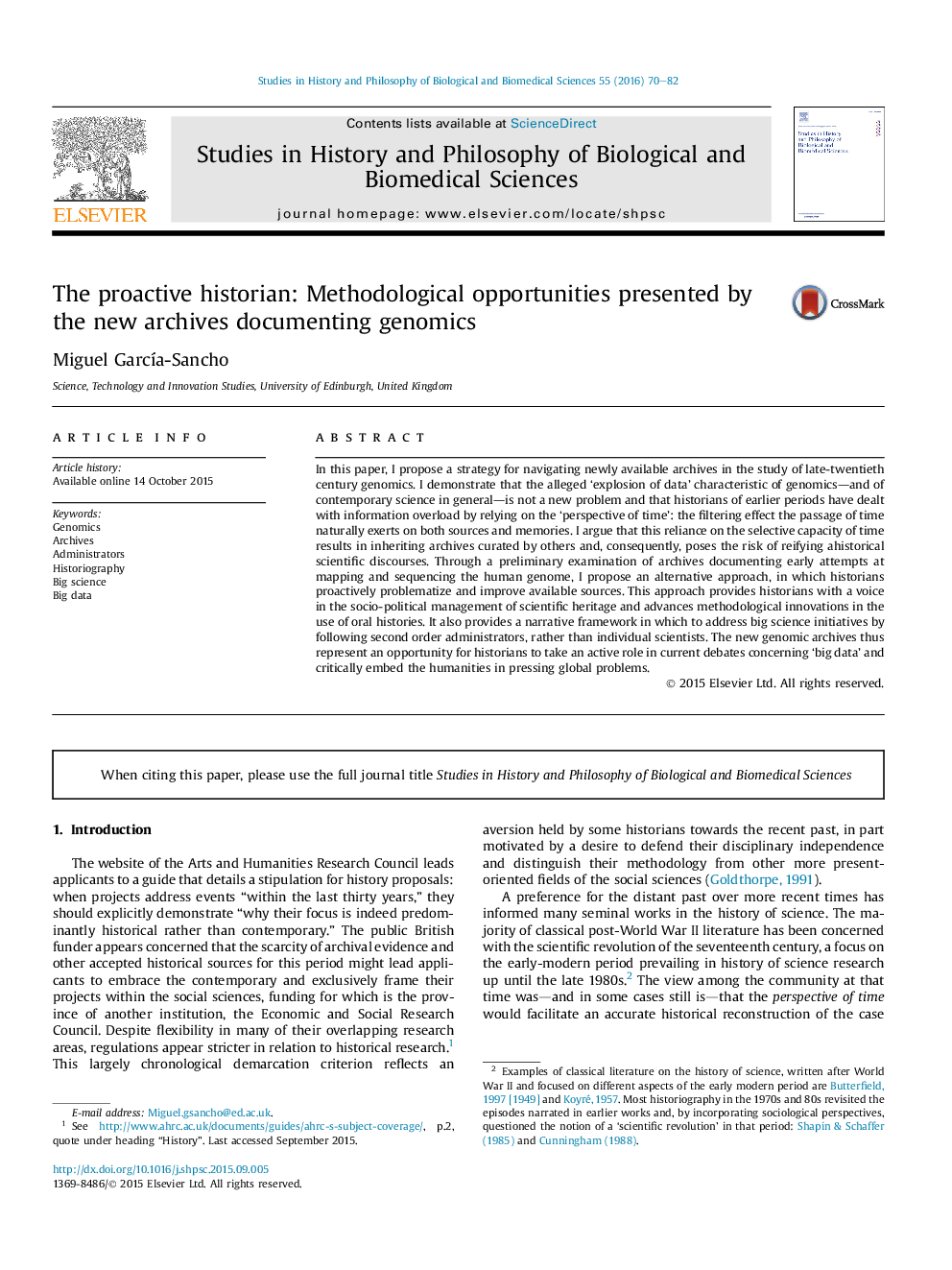| کد مقاله | کد نشریه | سال انتشار | مقاله انگلیسی | نسخه تمام متن |
|---|---|---|---|---|
| 7552322 | 1490510 | 2016 | 13 صفحه PDF | دانلود رایگان |
عنوان انگلیسی مقاله ISI
The proactive historian: Methodological opportunities presented by the new archives documenting genomics
ترجمه فارسی عنوان
مورخ پیشگام: فرصت های متدولوژیک ارائه شده توسط آرشیو های جدید که اسناد ژنومیک را نشان می دهند
دانلود مقاله + سفارش ترجمه
دانلود مقاله ISI انگلیسی
رایگان برای ایرانیان
کلمات کلیدی
ژنومیکس، بایگانی مدیران، تاریخ نگاری، علم بزرگ، اطلاعات بزرگ،
ترجمه چکیده
در این مقاله، یک استراتژی برای مرور آرشیوهای در دسترس را در مطالعه ژنوم قرن بیستم در قرن بیستم پیشنهاد می کنم. من نشان می دهم که انفجار داده های مشخصه ژنومیک و علم معاصر به طور کلی یک مشکل جدید نیست و مورخان دوره های قبلی با اضافه کردن اطلاعات با استفاده از «دیدگاه زمان» به کار گرفته شده اند: اثر فیلتر کردن گذر زمان به طور طبیعی بر روی هر دو منبع و خاطرات تاثیر می گذارد. من استدلال می کنم که این وابستگی به ظرفیت انتخابی زمان، منجر به ارث بردن آرشیوهایی است که توسط دیگران سرپرستی می شود و در نتیجه، خطر رونق گفتمان علمی تاریخی را به ارمغان می آورد. از طریق ارزیابی اولیه بایگانی که مستلزم تلاش های اولیه برای نقشه برداری و توالی ژنوم انسان است، من پیشنهاد یک رویکرد جایگزین را می دهم که در آن مورخان به طور فعالانه مشکلات موجود و منابع موجود را بهبود می بخشد. این رویکرد، مورخان را با صدای مدیریت اجتماعی و سیاسی میراث علمی فراهم می کند و نوآوری های روش شناختی را در استفاده از تاریخ شفاهی پیشرفت می دهد. همچنین یک چارچوب روایی فراهم می کند که در آن، به جای دانشمندان فردی، با پیروی از مدیران مرتبه دوم، ابتکارات علمی بزرگی را انجام دهد. بنابراین آرشیوهای ژنومی جدید فرصتی برای مورخان فراهم می کنند تا در بحث های جاری در مورد "داده های بزرگ" نقش مهمی ایفا کنند و بشریت را در مواجهه با مسائل جهانی بطور انتقادی جاسازی کنند.
موضوعات مرتبط
علوم زیستی و بیوفناوری
علوم کشاورزی و بیولوژیک
علوم کشاورزی و بیولوژیک (عمومی)
چکیده انگلیسی
In this paper, I propose a strategy for navigating newly available archives in the study of late-twentieth century genomics. I demonstrate that the alleged 'explosion of data' characteristic of genomics-and of contemporary science in general-is not a new problem and that historians of earlier periods have dealt with information overload by relying on the 'perspective of time': the filtering effect the passage of time naturally exerts on both sources and memories. I argue that this reliance on the selective capacity of time results in inheriting archives curated by others and, consequently, poses the risk of reifying ahistorical scientific discourses. Through a preliminary examination of archives documenting early attempts at mapping and sequencing the human genome, I propose an alternative approach, in which historians proactively problematize and improve available sources. This approach provides historians with a voice in the socio-political management of scientific heritage and advances methodological innovations in the use of oral histories. It also provides a narrative framework in which to address big science initiatives by following second order administrators, rather than individual scientists. The new genomic archives thus represent an opportunity for historians to take an active role in current debates concerning 'big data' and critically embed the humanities in pressing global problems.
ناشر
Database: Elsevier - ScienceDirect (ساینس دایرکت)
Journal: Studies in History and Philosophy of Science Part C: Studies in History and Philosophy of Biological and Biomedical Sciences - Volume 55, February 2016, Pages 70-82
Journal: Studies in History and Philosophy of Science Part C: Studies in History and Philosophy of Biological and Biomedical Sciences - Volume 55, February 2016, Pages 70-82
نویسندگان
Miguel GarcÃa-Sancho,
